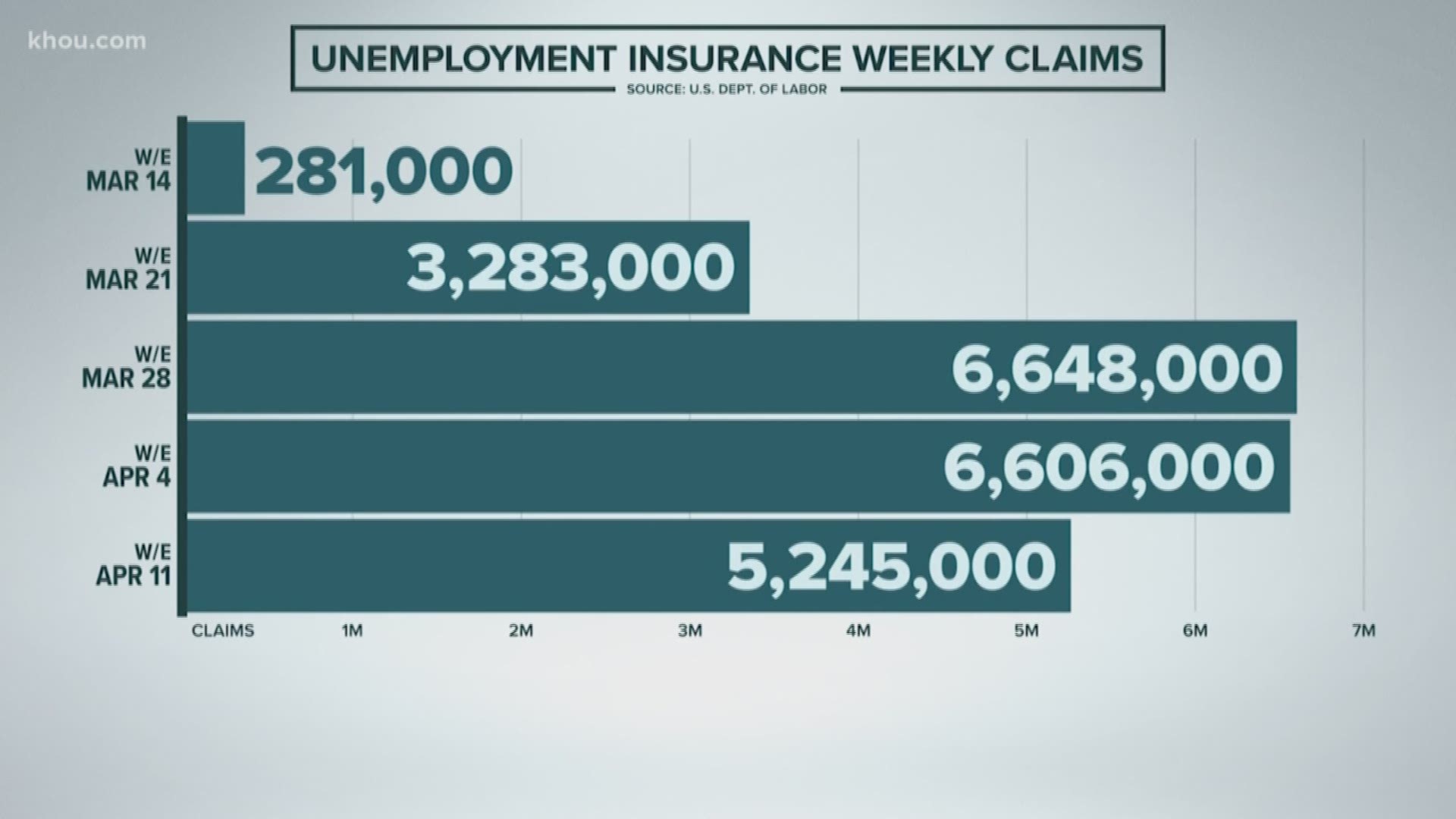HOUSTON — An unemployment office off the 610 Loop advertised “hot jobs” Thursday amid a frigid economy.
It’s mostly temporary work that may help some people cope.
"I'm standing on my feet, but it's getting to the point now that bills are there, and it's not coming together," said Kevin Cauley, a laid-off restaurant worker.
He's among the 22 million people who have filed a jobless claims in recent weeks.
5.2 million people filed last week alone, according to new U.S. Department of Labor data. That’s fewer than the 6.6 million a week before, but it's still astounding.
“This is hitting everybody," said UH Energy Fellow and economist Ed Hirs. "This is not a financially driven recession. This is a no economic activity recession.”
Here in Texas, 273,000 more jobless claims were filed last week. That brings the total during the COVID-19 crisis to more than a million.
But Hirs said just because you haven’t filed for unemployment doesn’t mean you haven’t lost your job.
And he believes the true numbers are more alarming.
"The Houston workforce is 3.2 million, so 10 percent would be 320,000," Hirs said. "I think we’ve already seen that many lose their jobs.”
The eventual recovery may be more rapid than previous recessions once things re-open.
However, Hirs said it may take up to a year for some sectors, like hospitality, to get back to any sense of normalcy.
"You know, it’s really easy to take a Sharpie and draw a V-shaped recovery," Hirs said. "I don’t think that’s going to happen.”
He said the oil and gas industry in Houston is having challenges in addition to what's going on with COVID-19, and its full impact might not be known until after the pandemic subsides.
Coronavirus symptoms
The symptoms of coronavirus can be similar to the flu or a bad cold. Symptoms include a fever, cough and shortness of breath, according to the Centers for Disease Control. Some patients also have nausea, body aches, headaches and stomach issues. Losing your sense of taste and/or smell can also be an early warning sign.
Most healthy people will have mild symptoms. A study of more than 72,000 patients by the Centers for Disease Control in China showed 80 percent of the cases there were mild.
But infections can cause pneumonia, severe acute respiratory syndrome, kidney failure and even death, according to the World Health Organization. Older people with underlying health conditions are most at risk for becoming seriously ill. However, U.S. experts are seeing a significant number of younger people being hospitalized, including some in ICU.
The CDC believes symptoms may appear anywhere from two to 14 days after being exposed.
Human coronaviruses are usually spread through...
- The air by coughing or sneezing
- Close personal contact, such as touching or shaking hands
- Touching an object or surface with the virus on it, then touching your mouth, nose or eyes before washing your hands.
Help stop the spread of coronavirus
- Stay home when you are sick.
- Eat and sleep separately from your family members
- Use different utensils and dishes
- Cover your cough or sneeze with your arm, not your hand.
- If you use a tissue, throw it in the trash.
- Follow social distancing
Lower your risk
- Wash your hands often with soap and water for at least 20 seconds. If soap and water are not available, use an alcohol-based hand sanitizer.
- Avoid touching your eyes, nose, and mouth with unwashed hands.
- Avoid close contact with people who are sick.
- Clean and disinfect frequently touched objects and surfaces.
- If you are 60 or over and have an underlying health condition such as cardiovascular disease, diabetes or respiratory illnesses like asthma or COPD, the World Health Organization advises you to try to avoid crowds or places where you might interact with people who are sick.
Get complete coverage of the coronavirus by texting 'FACTS' to 713-526-1111.

